Overview
This article highlights ten meaningful ways to celebrate Autistic Awareness Month, focusing on the vital role of community engagement, education, and advocacy. By detailing various initiatives—such as workshops, social media campaigns, and fundraising events—it fosters understanding and acceptance of autism. These efforts create a nurturing environment for individuals and families affected by developmental disorders. Together, we can build a supportive community that embraces and uplifts those on the spectrum.
Introduction
Autistic Awareness Month stands as a heartfelt reminder of the significance of understanding and celebrating neurodiversity. As our communities unite to raise awareness, it becomes increasingly vital to foster acceptance and support for individuals with autism. Yet, with a multitude of ways to engage—from local events and educational workshops to social media campaigns—how can we effectively contribute to this cause and truly make a meaningful impact? This article delves into ten dynamic strategies that not only elevate awareness but also nurture a culture of inclusivity and understanding for everyone.
ASD Media: Empowering Parents and Professionals for Autism Awareness Month
ASD Media plays a vital role in autistic awareness month by offering a wide range of resources tailored for both parents and professionals. Their dedication to enhancing ABA therapy execution shines through workshops, informative articles, and engaging activities that aim to educate and empower families. By sharing insights on overcoming common challenges, ASD Media fosters a supportive environment where individuals can exchange experiences and learn from one another. This collaborative approach not only raises awareness during autistic awareness month but also encourages effective strategies for managing autism-related challenges.
Recent studies indicate that public involvement in awareness initiatives for developmental disorders significantly boosts understanding and acceptance, underscoring the importance of ASD Media's efforts. Their resources for Neurodiversity Month 2025 include practical guides and motivational quotes, such as Temple Grandin's powerful statement, 'Different, not less.' This message inspires resilience and hope, reinforcing the idea that autism offers a unique way of experiencing the world.
The impact of ABA therapy during this month is profound, showcasing the transformative potential of early and intensive interventions. These approaches have been shown to yield significant improvements in communication and social skills, boasting a success rate of over 89% in enhancing essential abilities. Through their initiatives, ASD Media not only improves the application of ABA therapy but also nurtures a culture of acceptance and understanding, creating a lasting impact on individuals with developmental disorders by enhancing their communication skills and social interactions.
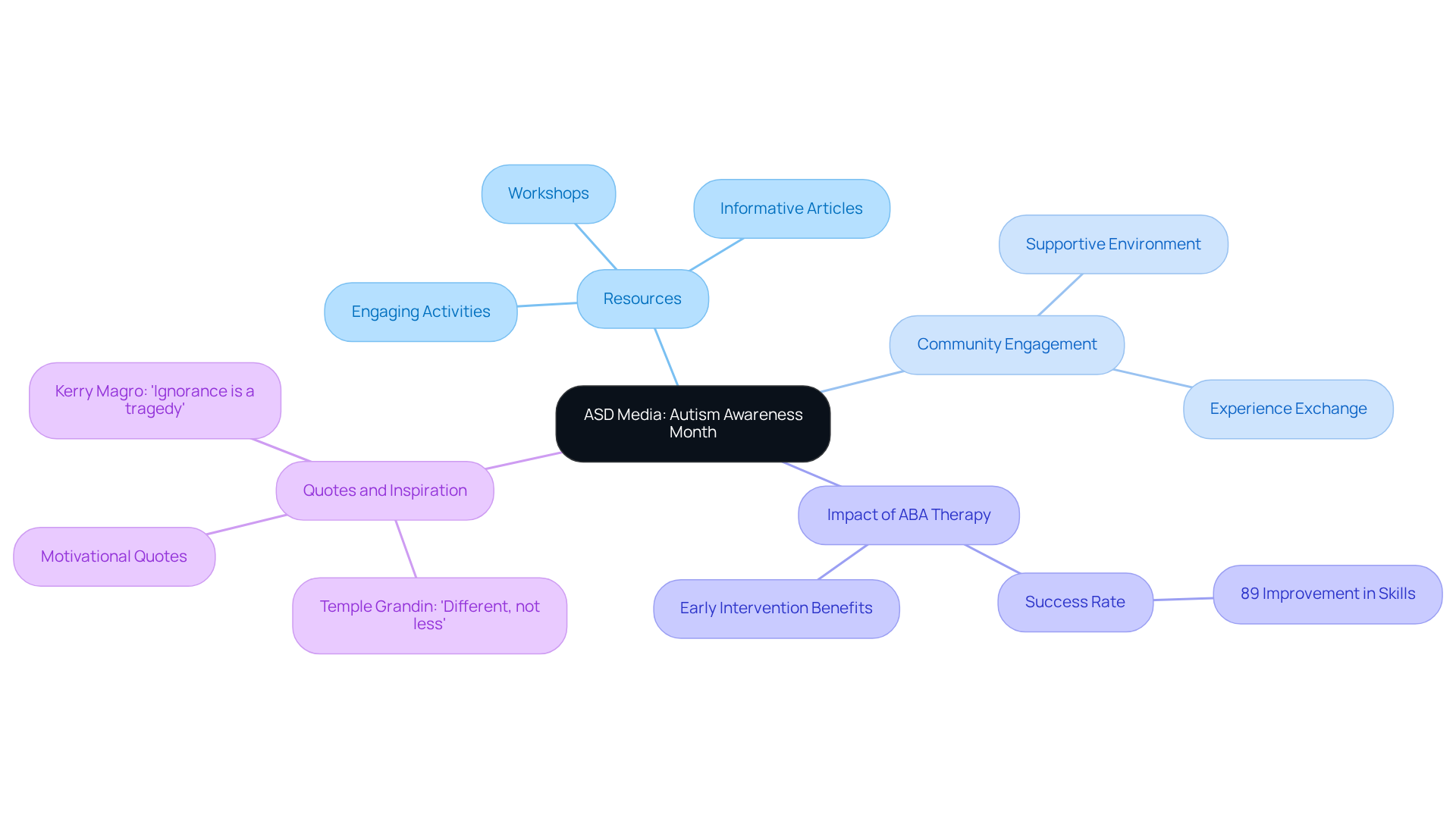
Local Community Events: Engage and Celebrate Autism Awareness Month Together
Local gatherings serve as vibrant platforms for celebrating Awareness Month, playing a crucial role in fostering engagement and support within the community. Activities such as walks, fairs, and informational booths invite families, educators, and local businesses to participate, nurturing a sense of belonging. These gatherings not only raise autistic awareness month but also cultivate an inclusive environment for individuals with autism and their families. The expansion of the Lighthouse Autism Center emphasizes that public involvement is essential for creating supportive networks.
Arranging sensory-friendly events, like film nights or art exhibitions, can significantly enhance participation and understanding. These initiatives encourage ongoing involvement and promote a culture of acceptance, ensuring that the message of awareness resonates well beyond April. By creating environments where everyone feels welcome, groups can effectively support individuals with autism and their unique needs.
Integrating these events aligns beautifully with ASD Media's mission to build a supportive community, highlighting the importance of collaboration and shared experiences. As we reflect on the impact of these gatherings, let us consider how we can each contribute to this nurturing atmosphere. How can you participate in or support these activities in your own community?
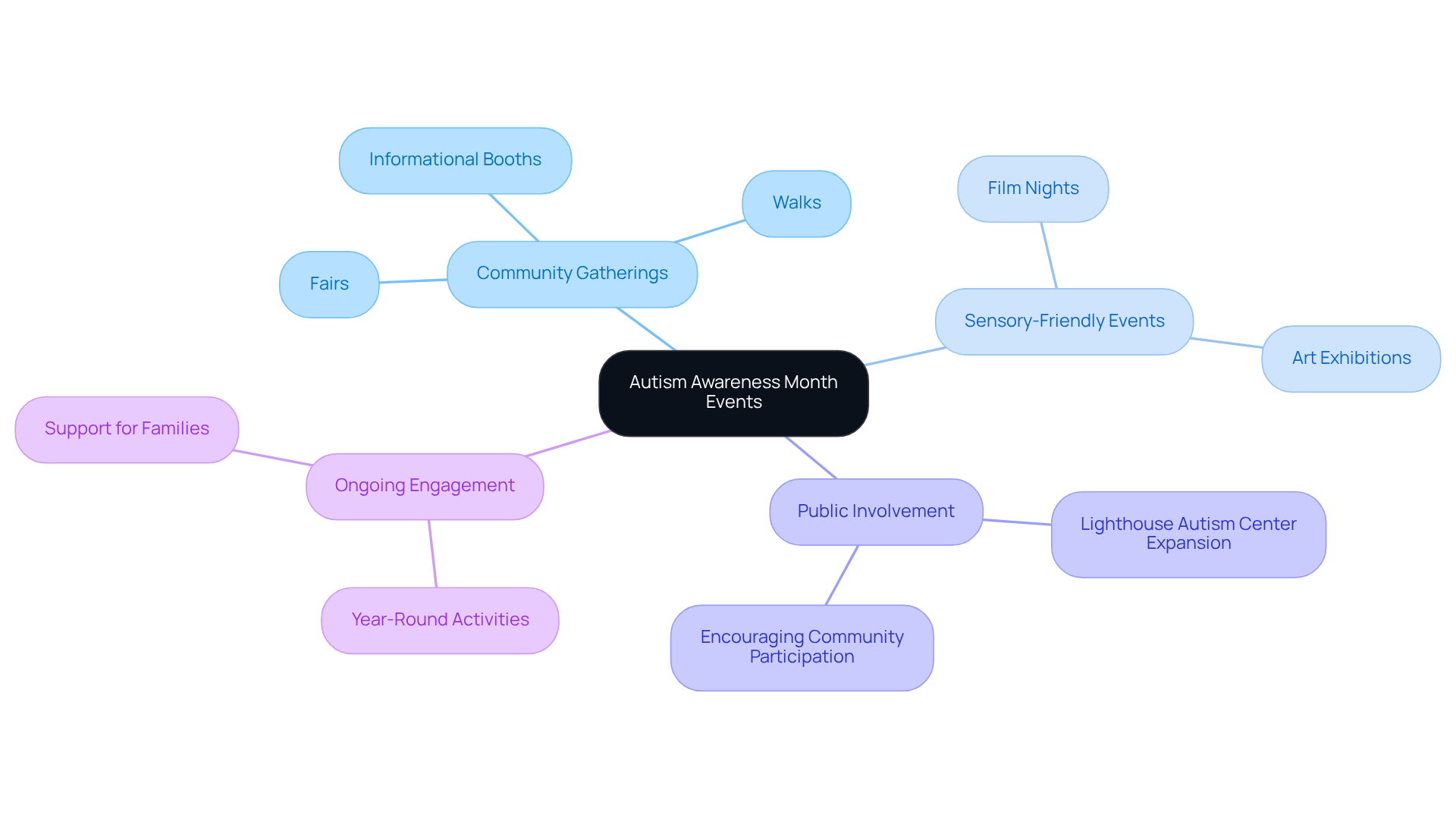
Social Media Campaigns: Amplify Your Voice for Autism Awareness Month
Social media initiatives hold the potential to amplify voices during Autistic Awareness Month. By utilizing platforms like Facebook, Instagram, and Twitter, both individuals and organizations can share informative posts, personal stories, and valuable resources that educate the public about neurodiversity. Hashtags such as #AutismAwareness and #LightItUpBlue serve to unify efforts and enhance visibility. Engaging with autistic individuals and advocates on these platforms nurtures a more inclusive dialogue, encouraging the sharing of diverse perspectives and experiences. Together, we can foster understanding and support within our communities, especially during autistic awareness month.
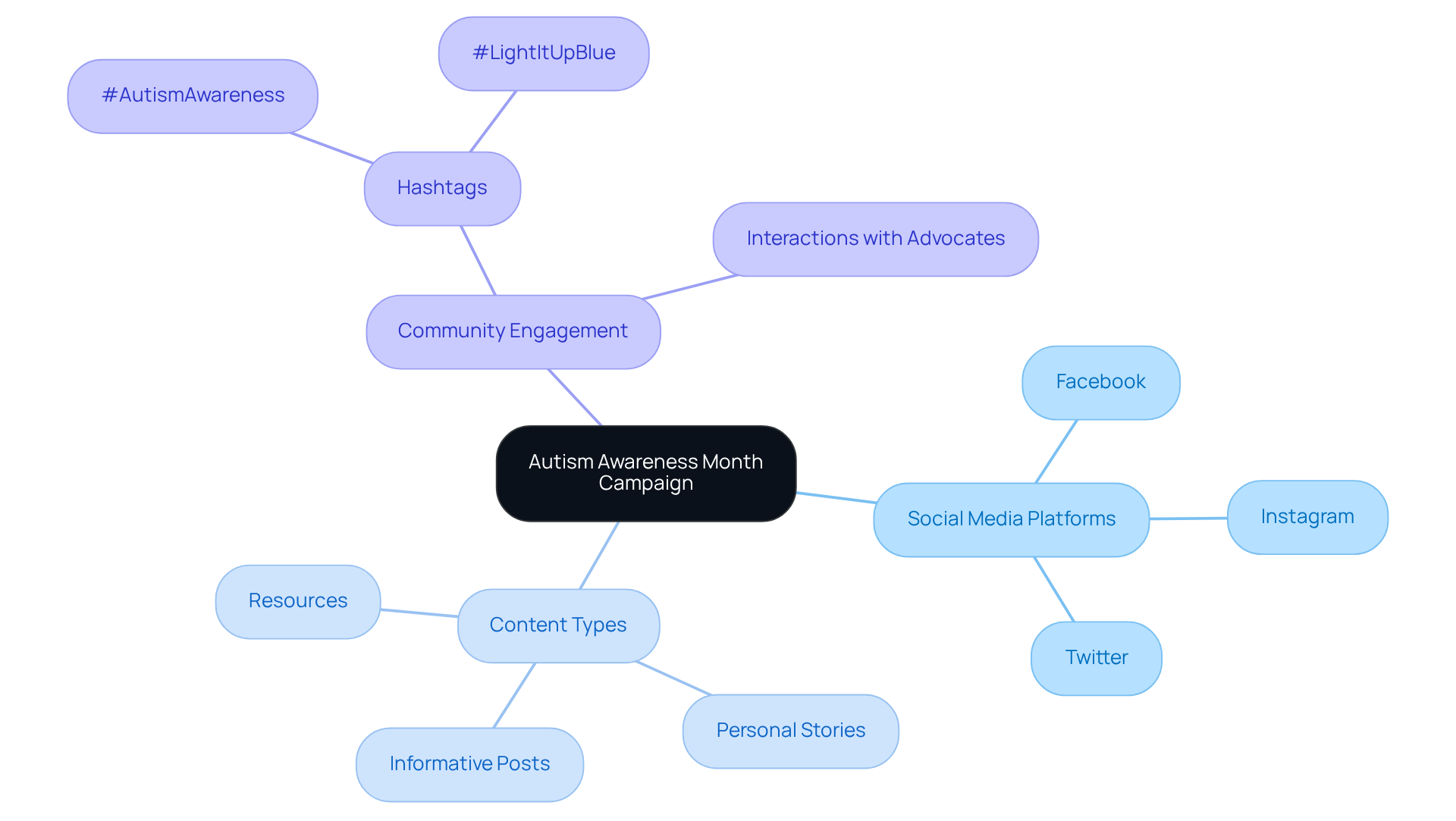
Educational Workshops: Inform and Inspire During Autism Awareness Month
Educational workshops play a crucial role in informing and inspiring individuals during autistic awareness month. These sessions cover a variety of important topics, such as:
- Understanding spectrum disorder
- Implementing effective ABA strategies
By featuring experienced speakers and practitioners—those skilled in behavioral chaining and reinforcement strategies—organizations can equip participants with actionable insights and practical tools to better support individuals with developmental disorders.
Moreover, workshops foster discussions that allow participants to share their personal experiences, creating a collaborative learning environment that enhances understanding and acceptance. The positive impact of these workshops is highlighted by data indicating significant improvements in knowledge and the application of ABA strategies among parents and professionals. This makes them an essential part of autism education.
However, it’s important to recognize that further research is necessary to identify the best conditions and populations for these workshops. This will ensure that they effectively meet the diverse needs of the community. We invite you to engage with these workshops and contribute to a more inclusive understanding of autism.
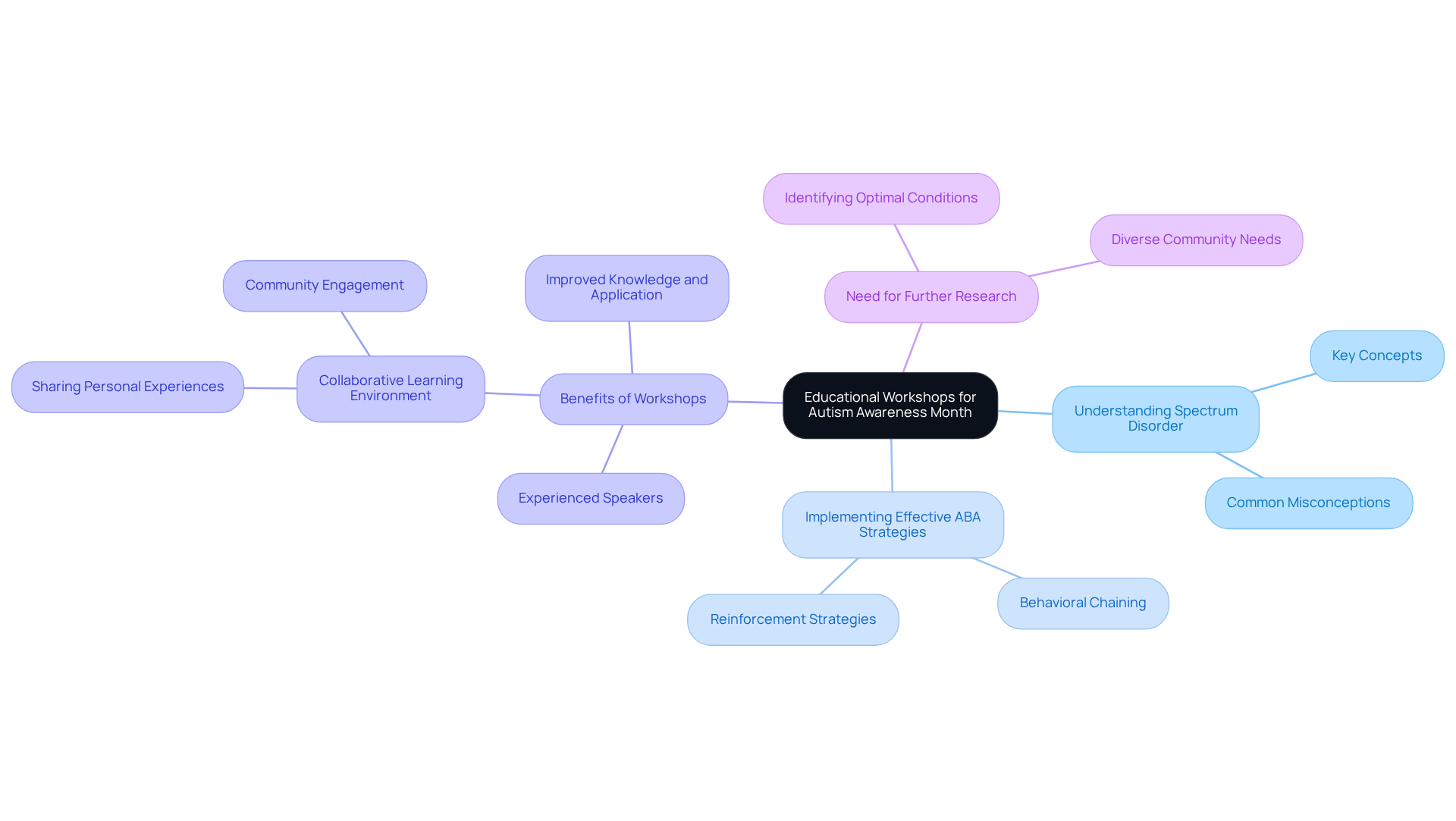
School Involvement: Create Awareness and Support in Educational Settings
Involving schools in activities during the month dedicated to autism is essential for fostering comprehension and assistance among students and staff. As Dr. Carly Lapin stated, 'April is Autistic Awareness Month, a time committed to increasing understanding about Autism Spectrum Disorder, fostering acceptance, and celebrating the unique strengths and abilities of children on the spectrum.' Schools can host assemblies, facilitate classroom discussions, and encourage art projects focused on awareness of neurodevelopmental disorders.
Implementing inclusive practices that celebrate neurodiversity fosters empathy and acceptance among students. For instance, educational workshops can provide valuable insights into the condition, enhancing the overall understanding of it. Awareness drives funding for vital autism research, leading to advancements in diagnosis, treatment, and interventions. By creating a culture of acceptance, schools can profoundly influence the lives of autistic students and their peers, promoting a more inclusive environment.
Activities such as sensory-friendly events and collaborative projects can further strengthen community ties and support networks, ensuring that every student feels valued and understood. Effective programs, such as those emphasized in the case study 'Getting Involved in Autistic Awareness Month,' showcase how schools can actively engage and demonstrate the beneficial results of such participation.

Art Exhibitions: Celebrate Creativity and Autism Awareness
Art exhibitions can be a beautiful way to celebrate autistic awareness month. By showcasing the imaginative creations of autistic individuals during autistic awareness month, these exhibitions not only highlight their unique skills but also foster a deeper understanding of autism. Community members have the opportunity to engage with the art, learn about the artists' experiences, and join in discussions that encourage acceptance and appreciation of neurodiversity.
Imagine the connections that can be formed when we partner with local galleries or schools to organize these events—it's a wonderful way to boost local engagement and support.
Fundraising Events: Support Autism Awareness Month Through Giving
Fundraising events during autistic awareness month are vital in enhancing resources for support and research on developmental disorders. Events like charity runs, bake sales, and auctions not only engage local residents but also generate crucial funds for nearby organizations that support individuals with developmental disorders. These initiatives serve a dual purpose: they provide financial backing while simultaneously raising autistic awareness month and addressing the unique challenges faced by individuals and families with neurodevelopmental disorders.
For example, community-based ABA therapy has been shown to significantly improve social skills development, as highlighted in the case study 'The Benefits of Community-Based ABA Therapy for Social Skills Development.' This underscores the collaborative nature of such interventions. Encouraging local businesses to sponsor or participate in these events can amplify their reach and impact, fostering a collaborative environment that benefits everyone involved.
By creating opportunities for public involvement, these fundraising efforts contribute to a more inclusive society and empower families to access essential resources. Additionally, subscribing to ASD Media's newsletter keeps advocates updated on the latest news and resources, further strengthening the support network.
It’s also essential to recognize the importance of racial and cultural diversity in these fundraising efforts, ensuring that all voices are represented and included in the conversation. Together, we can make a difference and create a supportive community for those affected by developmental disorders.
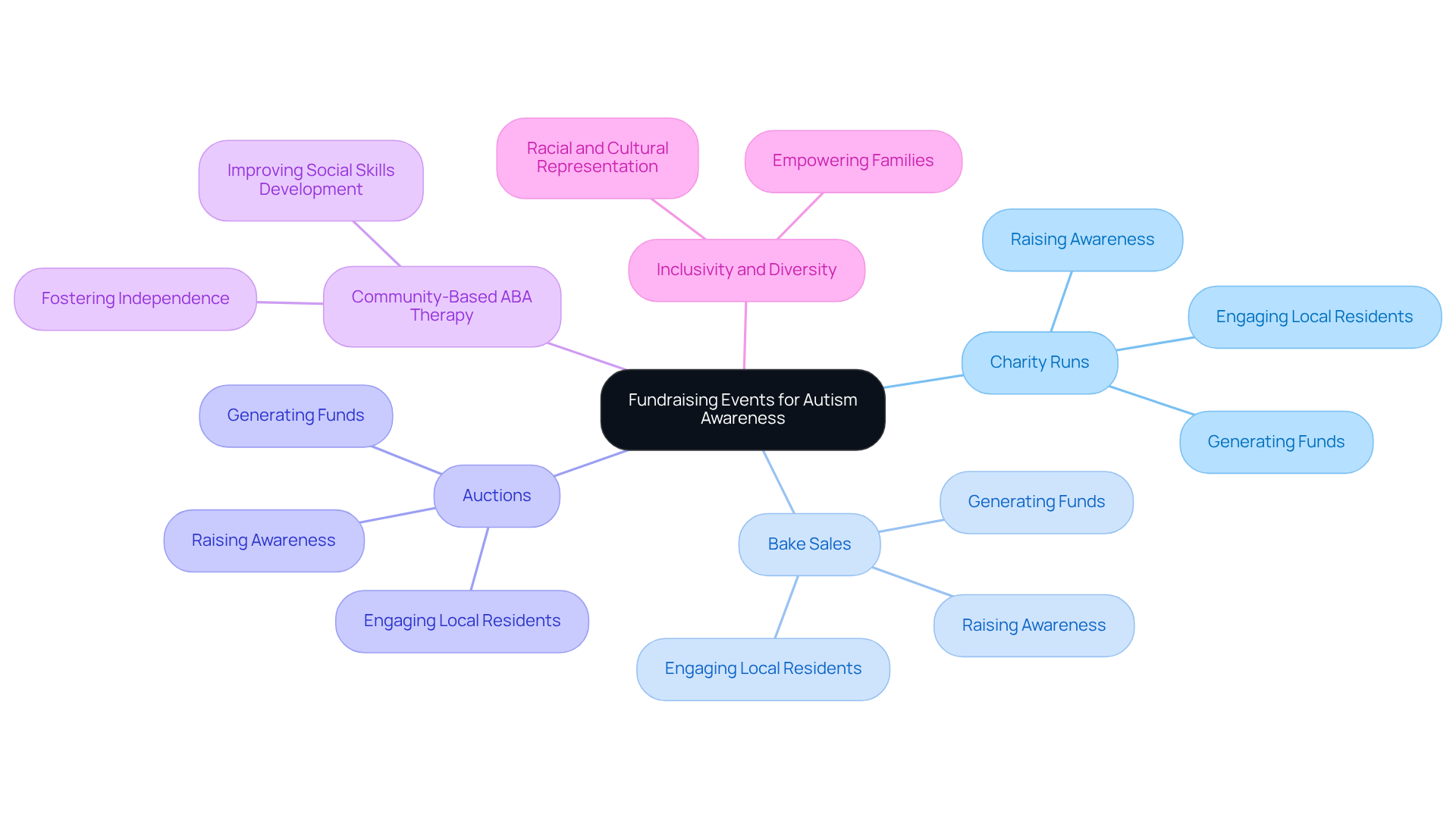
Personal Stories: Share Experiences to Foster Understanding During Autism Awareness Month
Sharing personal stories during autistic awareness month is essential in fostering understanding and empathy among individuals. Families and individuals can share their experiences through:
- Blogs
- Social platforms
- Local events
These narratives highlight both the challenges and successes of living with autism. They are vital in dismantling stereotypes and misconceptions, paving the way for a more nuanced understanding of the condition. Research shows that personal narratives significantly influence societal perceptions, with studies indicating that sharing experiences can lead to a 30% increase in empathy towards autistic individuals.
By amplifying varied perspectives, we create a more inclusive atmosphere, ultimately improving support for those affected by developmental disorders. Successful narratives not only illuminate individual journeys but also inspire collective action, fostering a culture of acceptance and understanding that benefits everyone.
As of 2023, around 1 in 36 children in the U.S. has been diagnosed with autism, underscoring the importance of representation in these narratives. The evolution of Neurodiversity Month, from simple recognition to fostering acceptance, further highlights the significance of sharing personal stories in building a supportive community, especially during autistic awareness month, which aligns with ASD Media's mission to empower parents and professionals.
We invite you to share your experiences in the comments or through newsletters, as your voice can make a difference.
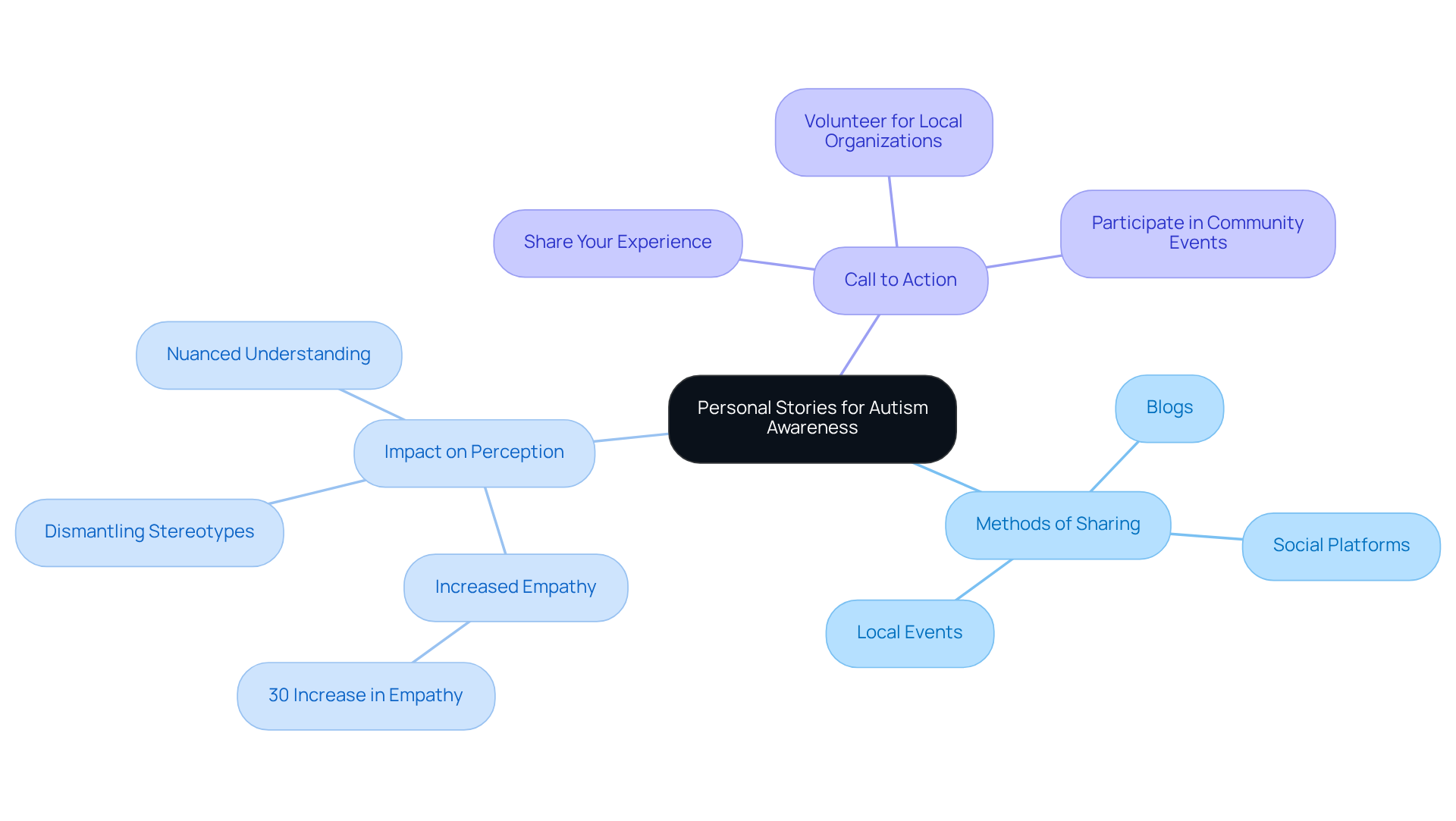
Business Partnerships: Collaborate for Autism Awareness Month Success
Partnering with local businesses during autistic awareness month can significantly amplify the effectiveness of awareness initiatives. By sponsoring events, providing essential resources, or leveraging their platforms to promote autism awareness, businesses can play a pivotal role. Participating in public outreach not only demonstrates a commitment to social responsibility but also nurtures a culture of acceptance and understanding. These effective partnerships can lead to joint campaigns that improve visibility and promote wider public participation.
For instance, organizations like Kelberman have successfully arranged family events, such as the one at Fort Rickey Discovery Zoo, showcasing how local businesses can contribute to inclusive social activities. Additionally, the $1,000 Stewart’s Grant awarded to Kelberman highlights the tangible impact of financial support for such initiatives. As Kerry Magro aptly states, 'Ignorance is a disorder, and it’s contagious.' Chris Packham adds, 'This condition is not a disease, it’s a difference,' emphasizing the need for proactive engagement in advocacy for individuals with this condition.
By endorsing initiatives during autistic awareness month for developmental disorders, local enterprises can create a significant influence, altering views and encouraging acceptance within their surroundings. Together, we can foster a community that understands and supports individuals with autism, making a lasting difference in their lives.
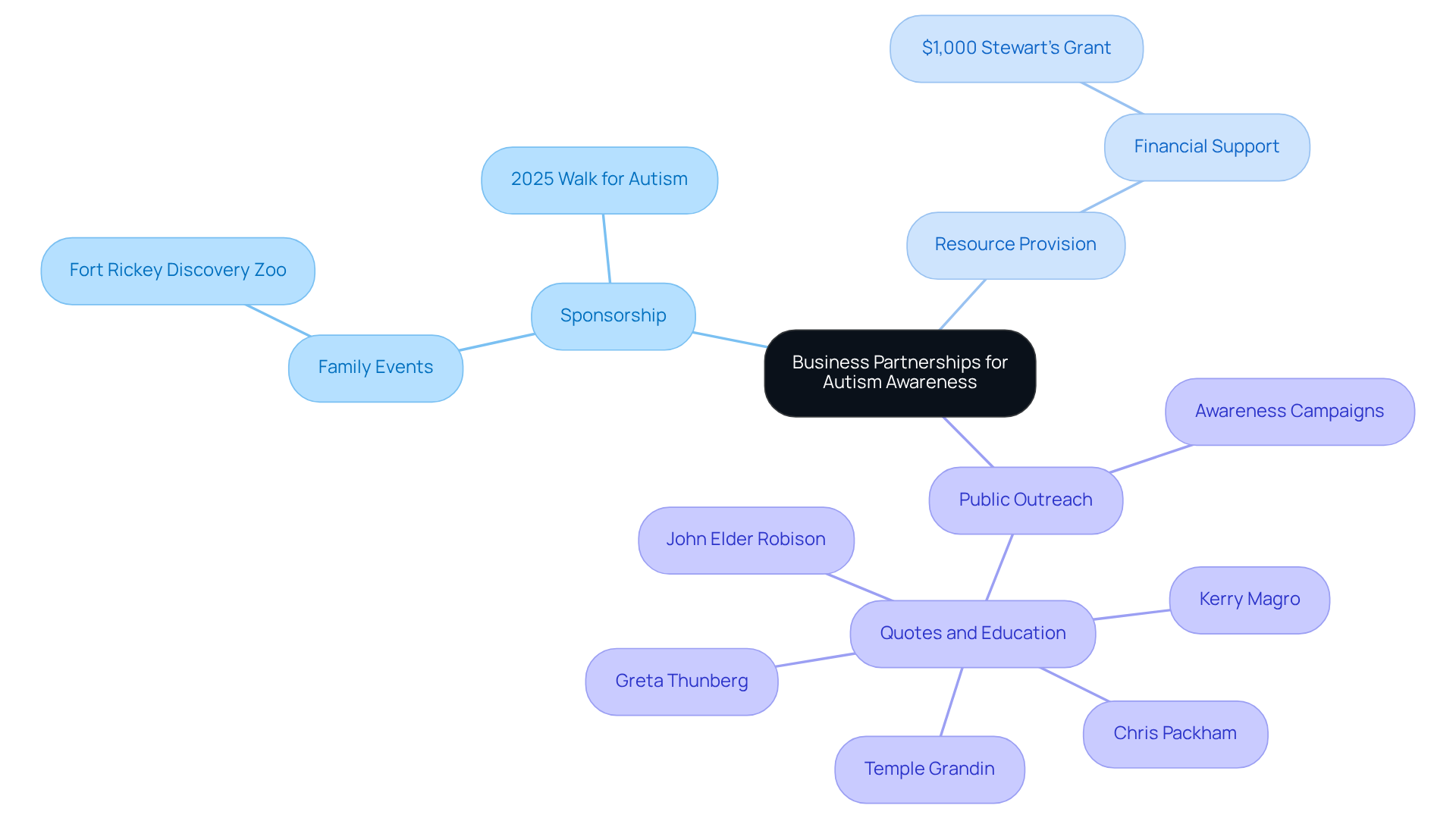
Advocacy Efforts: Drive Change for Autism Awareness and Acceptance
Advocacy efforts during autistic awareness month play a crucial role in fostering systemic change and enhancing acceptance within our communities. These campaigns, which focus on policy reform, accessibility, and inclusion, not only raise awareness about the rights and needs of individuals with developmental differences but also empower groups to take meaningful action. Imagine the impact of collaborating with advocacy organizations and engaging in local government initiatives—these efforts can significantly amplify our collective voice.
By mobilizing community members and stakeholders, advocacy can lead to substantial improvements in the lives of those affected by autism, nurturing a culture of acceptance and understanding. Successful campaigns during autistic awareness month have shown us that when we come together, we can drive policy reform, ensuring that the voices of autistic individuals are not only heard but also respected. This is an invitation to join in the conversation and support these vital initiatives, as every step we take brings us closer to a more inclusive society.
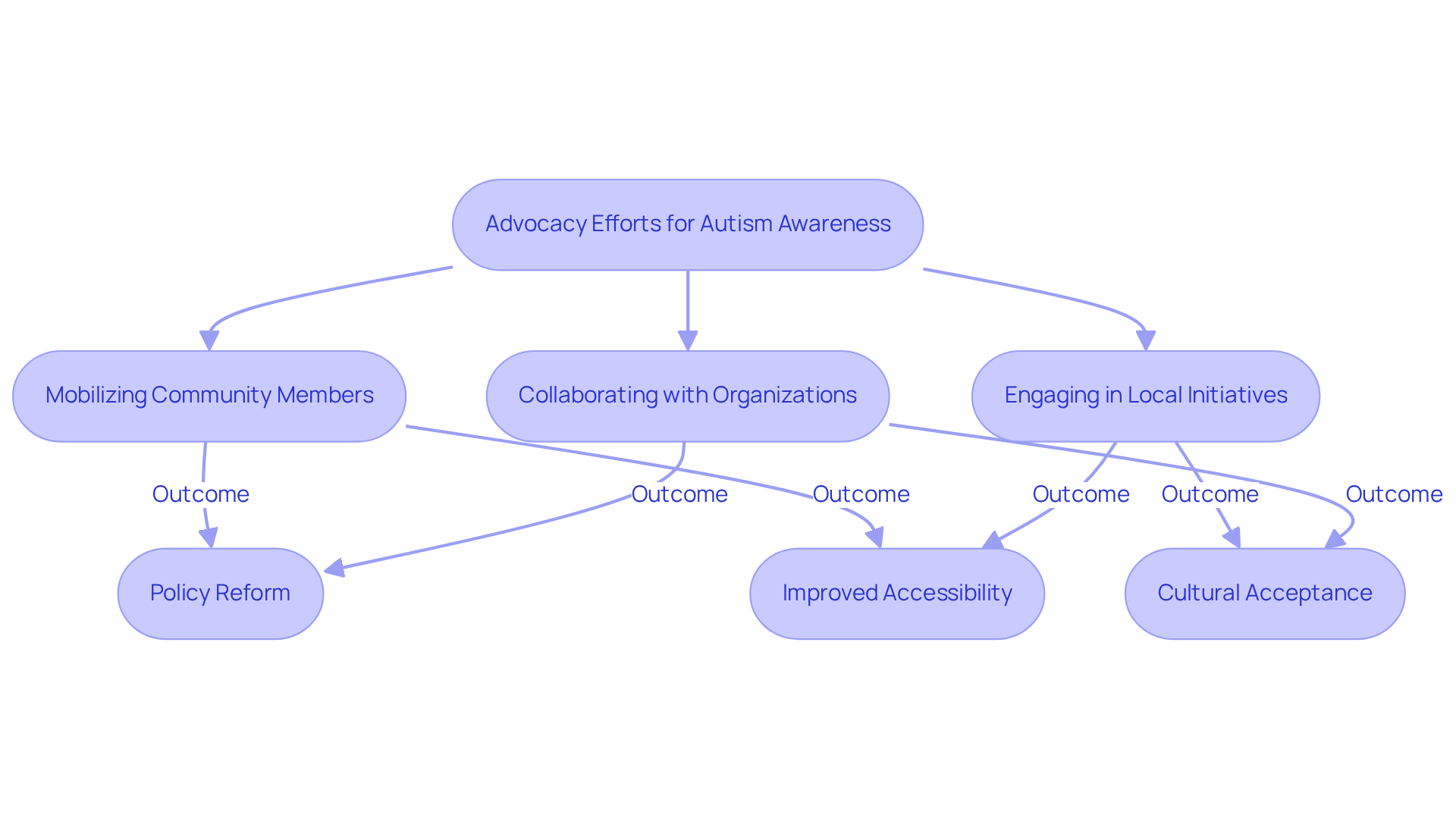
Conclusion
Autistic Awareness Month is a vital opportunity to deepen our understanding and foster acceptance of neurodiversity within our communities. Engaging in various activities—from local events and educational workshops to social media campaigns—allows individuals and organizations to contribute significantly to a culture that celebrates and supports those with autism. This multifaceted approach highlights the importance of collective efforts in raising awareness and promoting inclusivity.
Key strategies discussed include:
- The role of ASD Media in providing valuable resources for parents and professionals
- The impact of community events that invite participation
- The power of social media campaigns to amplify diverse voices
- Educational workshops and school involvement, which stand out as essential components that enhance understanding and acceptance among students and families alike
- Personal stories and business partnerships that enrich the dialogue surrounding autism, emphasizing that collaboration and shared experiences are crucial for creating supportive environments
Ultimately, the significance of Autism Awareness Month extends far beyond April; it calls for a sustained commitment to advocacy and inclusivity throughout the year. By actively participating in these initiatives, we can help shape a more understanding and accepting society for those affected by autism. Embracing this mission not only benefits individuals with developmental disorders but also enriches our communities as a whole, fostering an environment where everyone can thrive.
Frequently Asked Questions
What role does ASD Media play during Autism Awareness Month?
ASD Media provides a wide range of resources for parents and professionals, including workshops, informative articles, and engaging activities aimed at educating and empowering families about autism.
How does ASD Media support families dealing with autism?
ASD Media shares insights on overcoming common challenges, fosters a supportive environment for experience exchange, and encourages effective strategies for managing autism-related challenges.
What is the significance of public involvement in autism awareness initiatives?
Recent studies indicate that public involvement in awareness initiatives significantly boosts understanding and acceptance of developmental disorders, highlighting the importance of ASD Media's efforts.
What resources does ASD Media offer for Neurodiversity Month 2025?
ASD Media offers practical guides and motivational quotes, including Temple Grandin's statement, "Different, not less," which promotes resilience and hope regarding autism.
What impact does ABA therapy have during Autism Awareness Month?
ABA therapy has a profound impact, showcasing the transformative potential of early and intensive interventions, with a success rate of over 89% in enhancing communication and social skills.
How do local community events contribute to Autism Awareness Month?
Local gatherings, such as walks and fairs, foster engagement and support within the community, raising awareness and cultivating an inclusive environment for individuals with autism and their families.
What are sensory-friendly events, and why are they important?
Sensory-friendly events, like film nights or art exhibitions, enhance participation and understanding by creating welcoming environments for individuals with autism, promoting ongoing involvement and acceptance.
How can social media campaigns amplify voices for Autism Awareness Month?
Social media initiatives allow individuals and organizations to share informative posts, personal stories, and resources, using hashtags like #AutismAwareness to unify efforts and enhance visibility.
What is the importance of engaging with autistic individuals and advocates on social media?
Engaging with autistic individuals and advocates nurtures a more inclusive dialogue, encouraging the sharing of diverse perspectives and experiences, which fosters understanding and support within communities.




